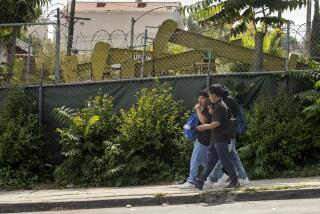Weather Slows Alaskan Oil Cleanup Work : Governor to Seek Federal Aid After Largest U.S. Oil Spill
- Share via
ANCHORAGE, Alaska — Rising winds today threatened efforts by about 200 workers to clean up the worst oil spill in North America, and Alaska’s governor said he will ask President Bush to declare Prince William Sound a federal disaster area.
Gov. Steve Cowper has declared a state of emergency in the area--one of the nation’s richest waterways--where 11 million gallons of crude oil gushed from the supertanker Exxon Valdez when it ran aground last Friday.
Cowper said he will ask Bush to declare the sound a federal disaster area to free funds for the immediate cleanup.
“I say immediately because it’s clear that Exxon is going to have to foot the bill sooner or later,” he said. “I don’t want to see any equipment sitting in port and waiting for a decision on whose decision it is to use it.”
The Exxon Shipping Co., which owns the Exxon Valdez, said an unqualified officer was in charge of the 987-foot supertanker at the time of the accident, which punctured eight of its 13 cargo tanks and spilled about 260,000 barrels of oil.
100 Square Miles
The flow of North Slope oil through the Alaskan Pipeline to Valdez has been cut to 800,000 barrels per day from its normal 2 million. The Alaskan Department of Environmental Conservation said tanker traffic could resume by Friday at the latest.
The Coast Guard said the spill grew to 100 square miles today and that rising winds--reaching up to 30 knots--and five- to six-foot seas threatened to hamper clean up efforts after calm weather over the weekend.
Crews concentrated part of their efforts on pumping nearly 1 million barrels of oil remaining in the grounded tanker, perched on a rock reef 25 nautical miles south of Valdez, into another tanker, the Exxon Baton Rouge, tied alongside.
“It’s precariously balanced on the reef,” Cowper said of the ship. “We don’t want to have it roll over to one side and capsize. We also don’t want it to break in half, obviously.”
The governor said in a radio interview that there were problems with the tanker because the computer that monitors its stability was “knocked out of whack” when it struck the rocks.
He said very little of the spilled oil had reached the shoreline, but the Coast Guard said it had sent a group of seine fishing craft to lay booms around Bligh Island and the nearby subsistance fishing villages of Tatitlek and Galena. An Anchorage doctor said mandated blood alcohol tests of the captain, third mate and the helmsman might not be valid because samples were taken late.
More to Read
Sign up for Essential California
The most important California stories and recommendations in your inbox every morning.
You may occasionally receive promotional content from the Los Angeles Times.













